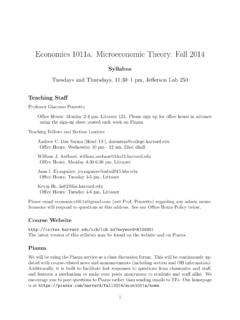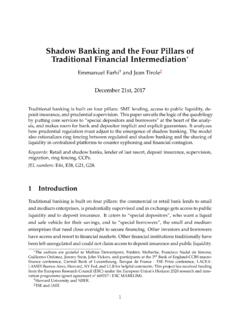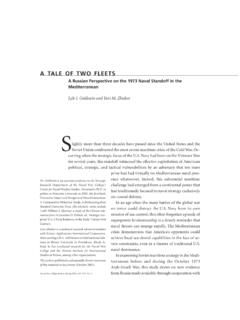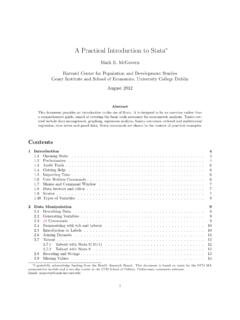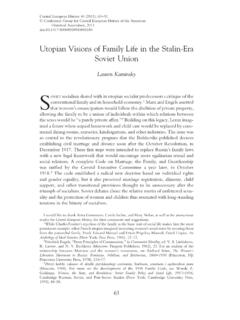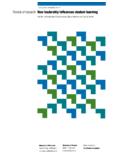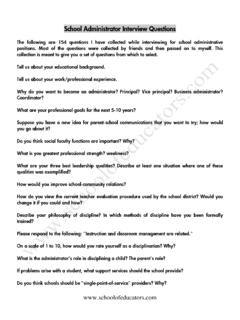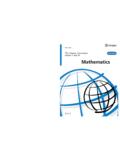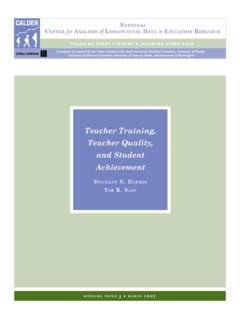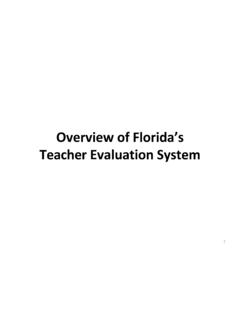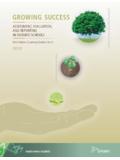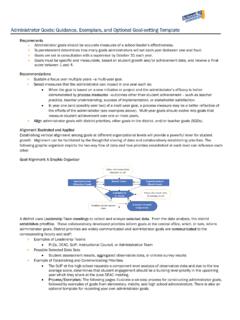Transcription of The Effect of Evaluation on Teacher Performance
1 1 The Effect of Evaluation on Teacher Performance BY ERIC S. TAYLOR AND JOHN H. TYLER* Teacher Performance Evaluation has become a dominant theme in school reform efforts. Yet whether Evaluation changes the Performance of teachers, the focus of this paper, is unknown. Instead Evaluation has largely been studied as an input to selective dismissal decisions. We study mid-career teachers for whom we observe an objective measure of productivity value-added to student achievement before, during, and after Evaluation . We find teachers are more productive in post- Evaluation years, with the largest improvements among teachers performing relatively poorly ex-ante. The results suggest teachers can gain information from Evaluation and subsequently develop new skills, increase long-run effort, or both.
2 The Effect of Evaluation on employee Performance has been a long-standing interest shared by researchers, firms, and policy makers across sectors. Still, relatively little empirical attention has been given to the potential long-run effects of Performance evaluations including employee skill development. This topic is increasingly salient for American public schools as over the past decade * Taylor: Stanford University, 520 Galvez Mall, CERAS Building, Room 509, Stanford, CA 94305 (e-mail: Tyler: Brown University, Box 1938, Providence, RI 02905 (e-mail: Authors are listed alphabetically. The authors would like to thank Eric Bettinger, Ken Chay, David Figlio, Caroline Hoxby, Susan Moore Johnson, Susanna Loeb, Doug Staiger, two anonymous reviewers, and seminar participants at Wellesley, Stanford, and the NBER Education Program for helpful comments on previous drafts of this paper.))
3 The research reported here was supported in part by the Institute of Education Sciences, Department of Education, through Grant R305C090023 to the President and Fellows of Harvard College. The opinions expressed are those of the authors and do not represent views of the Institute or the Department of Education. We also gratefully acknowledge the Center for Education Policy Research at Harvard University, the Joyce Foundation for their generous support of this project, as well as the cooperation and support of the Cincinnati Public Schools. 2 evaluating Teacher effectiveness has become a dominant theme in the education sector. The emphasis on Evaluation is motivated by two oft-paired empirical conclusions: teachers vary greatly in ability to promote student achievement growth, but typically observable Teacher characteristics like graduate education and experience (beyond the first few years) are not correlated with increased productivity.
4 Many researchers and policy makers have suggested that, under these conditions, the only way to adjust the Teacher distribution for the better is to gather information on individual productivity through Evaluation and then dismiss low performers. This paper offers evidence that Evaluation can shift the Teacher effectiveness distribution through a different mechanism: by improving Teacher skill, effort, or both in ways that persist long-run. We study a sample of mid-career math teachers in the Cincinnati Public Schools who were assigned to Evaluation in a manner that permits a quasi-experimental analysis. All teachers in our sample were evaluated by a year-long classroom-observation-based program, the treatment, between 2003-04 and 2009-10; the timing of each Teacher s specific Evaluation year was determined years earlier by a district planning process.
5 To this setting we add measures of student achievement , which were not part of the Evaluation , and use the within- Teacher over-time variation to compare Teacher Performance before, during, and after their Evaluation year. We find that teachers are more productive during the school year when they are being evaluated, but even more productive in the years after Evaluation . A student taught by a Teacher after that Teacher has been through the Cincinnati Evaluation will score about 10 percent of a standard deviation higher in math than a similar student taught by the same Teacher before the Teacher was evaluated. Under our identification strategy these estimates may be biased by patterns of student assignment which favor previously evaluated teachers, or by pre-existing positive trends in Teacher Performance .
6 We investigate these threats through event 3 studies and comparisons of observable Teacher and student characteristics across treatment groups, and find little evidence of bias. While the data do not provide information that allow us to identify the exact mechanisms driving the results, these gains in Teacher productivity are consistent with a model whereby teachers learn new information about their own Performance during the Evaluation and subsequently develop new skills, or increase long-run effort, or both. This information mechanism suggests that the general pattern of results may extend to other sectors and professions when individualized Performance information is scarce. The teachers in our sample who were in the middle of their careers and had not been evaluated systematically for some years may have been particularly responsive to the influx of new personalized Performance information created by classroom-observation-based Evaluation .
7 Effects may be smaller where personalized evaluative feedback is more regular. Nevertheless, the results of this analysis contrast sharply with the widely held perspective that the effectiveness of individual teachers cannot be changed much after the first few years on the job, suggesting a role for Teacher Evaluation beyond selective retention. Indeed, our estimates indicate that post- Evaluation improvements in Performance were largest for teachers whose Performance was weakest prior to Evaluation , suggesting that Teacher Evaluation may be an effective professional development tool. I. Related Literature and Mechanisms Motivated by large differences in productivity from Teacher to Teacher (see Hanushek and Rivkin 2010 for a review),1 research efforts have tried to identify predictors of Teacher productivity that could be used to inform human resource 1 While estimates across researchers and settings are relatively consistent, there remain questions about the empirical identification (Rothstein 2010; Todd and Wolpin 2003).
8 4 decisions. Many of the intuitive candidates, like the possession of a graduate degree or Teacher professional development, have proven to be dead ends (Yoon et al. 2007), and while teachers do improve with experience, the returns to experience appear to level off relatively quickly (Hanushek 1986, 1997; Rockoff 2004; Jacob 2007; Rockoff et al. 2011). Absent evidence that information traditionally found in a Teacher s personnel file can predict effectiveness, recent research efforts have turned to measuring individual Teacher Performance more directly. That literature suggests various measures of individual Teacher Performance are promising sources of information for human resource decisions. Some argue that the most direct and objective evidence of Teacher Performance are so called value-added measures based on student test score gains.
9 Using student-test-score-based measures, while intuitive, is not always possible and not without research and political controversy (Glazerman et al. 2010). Encouragingly, however, several other Performance appraisal approaches appear to be good predictors of a Teacher s ability to promote student achievement . These include subjective ratings by principals and other experienced educators who are familiar with the Teacher s day-to-day work (Jacob and Lefgren 2008; Rockoff and Speroni 2010; Rockoff et al. forthcoming), ratings based on structured classroom observation (Pam Grossman et al. 2010; Kane et al. 2011), student surveys (Kane and Cantrell 2010), and assessments of teachers by external evaluators like the National Board for Professional Teaching Standards (Goldhaber and Anthony 2007; Cantrell et al.)
10 2008). On the other hand, the formal status quo Teacher Evaluation programs currently utilized by most districts are perfunctory at best and conceal the variation in Performance (Weisberg et al. 2009). Assuming improved Teacher Performance measures can be adopted, much of the discussion regarding what to do with those measures has focused on selective dismissal. Predictions of the net gain of selective dismissal and retention are 5 mixed (Gordon, Kane, and Staiger 2006; Goldhaber and Hansen 2010; Hanushek 2011) and empirical evidence is very rare. One exception is a recent experimental study by Rockoff et al. (forthcoming) where principals in the treatment group were given objective student-test-score-based ratings of teachers.
